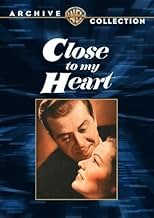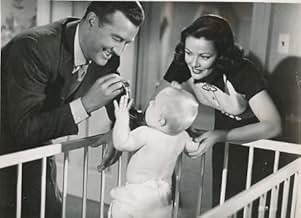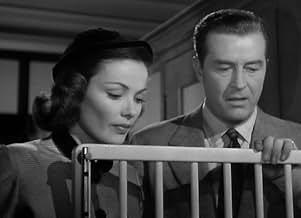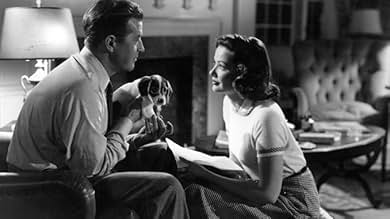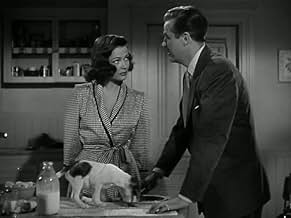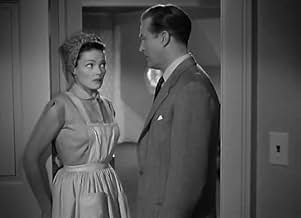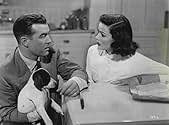VALUTAZIONE IMDb
6,5/10
564
LA TUA VALUTAZIONE
Aggiungi una trama nella tua linguaA columnist and his wife deal with obstacles when they try to adopt an abandoned baby.A columnist and his wife deal with obstacles when they try to adopt an abandoned baby.A columnist and his wife deal with obstacles when they try to adopt an abandoned baby.
- Regia
- Sceneggiatura
- Star
Baby John Winslow
- Baby Danny
- (as Baby John)
John Alvin
- Prospective Adoptive Father
- (non citato nei titoli originali)
Rodney Bell
- Young Parent in Car
- (non citato nei titoli originali)
Nan Boardman
- Woman Patient
- (non citato nei titoli originali)
Ralph Byrd
- Charlie
- (non citato nei titoli originali)
Luther Crockett
- Prison Warden
- (non citato nei titoli originali)
Douglas Hudson Finley
- Baby in other car
- (non citato nei titoli originali)
Elizabeth Flournoy
- Dr. Williams's Receptionist
- (non citato nei titoli originali)
Dick Gordon
- Clothing Store Owner
- (non citato nei titoli originali)
Fred Graham
- Prison Guard
- (non citato nei titoli originali)
Recensioni in evidenza
I give this movie 10 stars because I appreciate a storyline that promotes adoption!
I think adoption is a beautiful thing and I like that the wife character in this movie wasn't hung up on the idea that she had to give birth to a baby in order to be a mother.
I don't fault the husband character for his investigative work to research the abandoned baby's background; and while his quest for the truth causes friction, I like that it results in marital growth rather than separation.
I recommend this movie for anyone who enjoys the actors (Ray Milland and Gene Tierney) along with a happy ending. Thanks to TCM for airing it!
I think adoption is a beautiful thing and I like that the wife character in this movie wasn't hung up on the idea that she had to give birth to a baby in order to be a mother.
I don't fault the husband character for his investigative work to research the abandoned baby's background; and while his quest for the truth causes friction, I like that it results in marital growth rather than separation.
I recommend this movie for anyone who enjoys the actors (Ray Milland and Gene Tierney) along with a happy ending. Thanks to TCM for airing it!
This is a pretty good little film about a couple adopting a baby. It works best when it is looking at the couple at home dealing with the new child, or when they adopt a puppy as a substitute. This is all quite charming and although Gene Tierney is a little cloyingly sweet at times (and I might add ravishingly beautiful), Ray Milland is very good. Where the film is less successful is when it traces Milland's search for the baby's real parents - this all becomes a tad melodramatic. And Fay Bainter's oh-so-well-meaning adoption agency supervisor comes over as so mean and heartless in her treatment of Tierney that the film becomes unbelievable. She tortures the poor woman! Milland's final impassioned monologue to Bainter is impossible for any actor to play but Milland has a good stab at it. Overall very entertaining.
Ray Milland and Gene Tierney star in a near remake of Penny Serenade. They can't have children and explore the avenue of adoption. In the Beulah Bondi role of the agency inspector, Fay Bainter takes over. If you've seen her in Journey for Margaret, you know she can come across as concerned for children very well. This one has a couple of differences, mostly to do with Gene's character versus Irene Dunne's original version. Irene is sweet and deep-feeling, but Gene seems incredibly insincere and impulsive.
Everything out of Ray's mouth is hilarious and witty, adding a refreshing comic element to the story. I happened to agree with his side of the argument about adoption, but unfortunately, Hollywood took Gene's side. She's made out to be a natural mother who can't resist the baby in question, but I didn't believe her for a second. As is the case with many couples who have a great relationship, once child-rearing enters into the mix, fights and incompatibilities float to the surface. Ray and Gene were happy at the start of the movie, but when she becomes obsessed with the idea of adopting this particular baby, it strains their marriage. This movie also tackles the nature vs. Nurture debate that has stumped experts through the ages. If you have a strong opinion one way or the other, you might not like the message of the film. And while it's not as good as the original version, if you like the cast, you might want to give it a shot.
Everything out of Ray's mouth is hilarious and witty, adding a refreshing comic element to the story. I happened to agree with his side of the argument about adoption, but unfortunately, Hollywood took Gene's side. She's made out to be a natural mother who can't resist the baby in question, but I didn't believe her for a second. As is the case with many couples who have a great relationship, once child-rearing enters into the mix, fights and incompatibilities float to the surface. Ray and Gene were happy at the start of the movie, but when she becomes obsessed with the idea of adopting this particular baby, it strains their marriage. This movie also tackles the nature vs. Nurture debate that has stumped experts through the ages. If you have a strong opinion one way or the other, you might not like the message of the film. And while it's not as good as the original version, if you like the cast, you might want to give it a shot.
This rather obscure little film from '51 must have been one that attracted GENE TIERNEY, given the circumstances of her private life wherein her own parentage problems came about when her pregnancy resulted in a child born mentally retarded. She puts her heart and soul into her performance here, as the obsessive wife who "must" have a child to call her own regardless of where the child comes from. Hubby RAY MILLAND is more realistic about things and wants to know the background of any infant they adopt.
While she falls completely in love with the adopted infant boy, Milland, who is a newspaper columnist, decides to do his own research into the baby's real parents. Therein, the story takes a few melodramatic turns before the domestic problems are ironed out.
FAY BAINTER is excellent as the head of an adoption agency who wants to make sure both parents are right for the child. Her scenes with Tierney are sensitively played and well scripted. Tierney looks ravishing and there is no trace of the illness which would overtake her career in a few short years.
Milland has some good moments, especially toward the end when he has his final confrontation with Bainter, insisting that he's no longer holding the baby's criminal father as a factor in not signing the final adoption papers, having met with the man in prison and realizing that heredity is not going to poison the child.
Although the presentation is an intelligent enough one, there is the flavor of a Lifetime TV movie to the production (by today's standards), and it verges on being daytime soap opera in quality more than once. But fans of Gene Tierney and Ray Milland will like their performances in this one.
A nice background score by Max Steiner helps, as does the direction of William Keighley.
While she falls completely in love with the adopted infant boy, Milland, who is a newspaper columnist, decides to do his own research into the baby's real parents. Therein, the story takes a few melodramatic turns before the domestic problems are ironed out.
FAY BAINTER is excellent as the head of an adoption agency who wants to make sure both parents are right for the child. Her scenes with Tierney are sensitively played and well scripted. Tierney looks ravishing and there is no trace of the illness which would overtake her career in a few short years.
Milland has some good moments, especially toward the end when he has his final confrontation with Bainter, insisting that he's no longer holding the baby's criminal father as a factor in not signing the final adoption papers, having met with the man in prison and realizing that heredity is not going to poison the child.
Although the presentation is an intelligent enough one, there is the flavor of a Lifetime TV movie to the production (by today's standards), and it verges on being daytime soap opera in quality more than once. But fans of Gene Tierney and Ray Milland will like their performances in this one.
A nice background score by Max Steiner helps, as does the direction of William Keighley.
I remembered this movie from years ago, and somehow I had it stuck in my mind that James Stewart played the husband - it was the kind of role he was good at, especially the emotional closing scenes, but instead it is Ray Milland as journalist Brad Sheridan and Gene Tierney as Midge Sheridan. The opening scene shows a doctor telling Midge that she will never be able to have a child. She takes the news hard, but then she and her husband of four years begin looking for a baby.
They go to an adoption agency - actually Midge does - and is told there is a two year waiting list by the sympathetic head of the agency, Mrs. Morrow (Fay Bainter). But they get a tip about a foundling left at a police station, and Midge goes to visit him. She goes to visit every day at the orphanage, bathes him, cares for him, brings him dolls. Eventually the Sheridans get permission to take him home with them in hopes it will lead to adoption. They name the child "Danny" in the meantime.
Midge doesn't care who his parents are, but Brad is not so sure, especially when he finds out about an adopted boy who became a criminal in spite of being brought up in a good adoptive home. Mrs. Morrow is worried that if Brad finds out his parentage is "bad" that he will never treat Danny like a true blank slate. However, part worry over the possible mental heritage of Danny, part the natural curiosity of a blood-hound reporter has him chasing leads to find out how Danny came to be abandoned and who did the abandoning. What does he find out? Watch and find out.
This really is a sentimental journey, and you have to leave your modern sensibilities on hold to enjoy this little story from 66 years ago. How can a middling journalist afford a house that looks like a bank president's on one salary? Why does Midge go to the doctor to learn of her infertility AND to the adoption agency alone? Why does Midge dress to the nines to clean house and handle the baby? Doesn't Mrs. Morrow have anything better to do than to follow Brad's search for Danny's parents? You are just going to have to forget about these questions.
The acting here is quite good, and Ray Milland shows a side of his acting chops as a normal family man that he seldom got to do over at his home studio of Paramount. As usual, Max Steiner's score sets just the right mood. Do note that not everybody in the 50s agreed with what this film was trying to say about criminology here. For an alternate view watch 1956's "Bad Seed".
They go to an adoption agency - actually Midge does - and is told there is a two year waiting list by the sympathetic head of the agency, Mrs. Morrow (Fay Bainter). But they get a tip about a foundling left at a police station, and Midge goes to visit him. She goes to visit every day at the orphanage, bathes him, cares for him, brings him dolls. Eventually the Sheridans get permission to take him home with them in hopes it will lead to adoption. They name the child "Danny" in the meantime.
Midge doesn't care who his parents are, but Brad is not so sure, especially when he finds out about an adopted boy who became a criminal in spite of being brought up in a good adoptive home. Mrs. Morrow is worried that if Brad finds out his parentage is "bad" that he will never treat Danny like a true blank slate. However, part worry over the possible mental heritage of Danny, part the natural curiosity of a blood-hound reporter has him chasing leads to find out how Danny came to be abandoned and who did the abandoning. What does he find out? Watch and find out.
This really is a sentimental journey, and you have to leave your modern sensibilities on hold to enjoy this little story from 66 years ago. How can a middling journalist afford a house that looks like a bank president's on one salary? Why does Midge go to the doctor to learn of her infertility AND to the adoption agency alone? Why does Midge dress to the nines to clean house and handle the baby? Doesn't Mrs. Morrow have anything better to do than to follow Brad's search for Danny's parents? You are just going to have to forget about these questions.
The acting here is quite good, and Ray Milland shows a side of his acting chops as a normal family man that he seldom got to do over at his home studio of Paramount. As usual, Max Steiner's score sets just the right mood. Do note that not everybody in the 50s agreed with what this film was trying to say about criminology here. For an alternate view watch 1956's "Bad Seed".
Lo sapevi?
- QuizThe Sheridans' car is a 1951 Ford Custom Deluxe convertible coupe.
I più visti
Accedi per valutare e creare un elenco di titoli salvati per ottenere consigli personalizzati
Dettagli
- Data di uscita
- Paese di origine
- Lingua
- Celebre anche come
- Close to My Heart
- Luoghi delle riprese
- Azienda produttrice
- Vedi altri crediti dell’azienda su IMDbPro
- Tempo di esecuzione
- 1h 30min(90 min)
- Colore
- Proporzioni
- 1.37 : 1
Contribuisci a questa pagina
Suggerisci una modifica o aggiungi i contenuti mancanti

